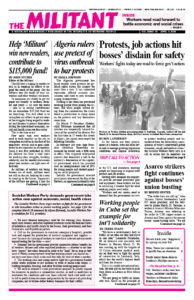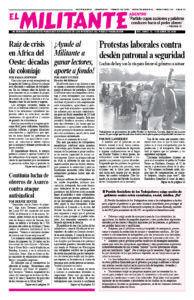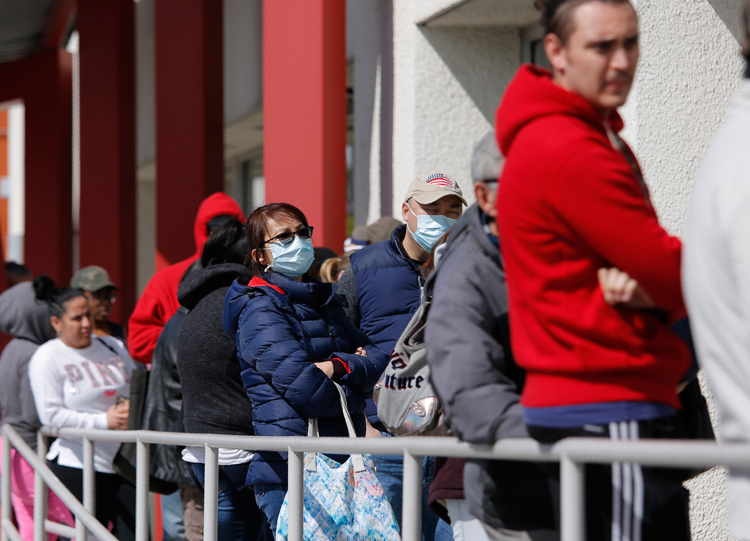The coronavirus pandemic has precipitated the fastest fall ever on the capitalists’ stock markets the world over, posing the need for workers to organize and chart a road forward out of the unfolding economic and social crises.
In the U.S. and around the world, the capitalist rulers are trying to stem the virus tide by shutting down much of the economy and globalized world production and trade, apart from “essential” industries and services. Borders have been closed, lockdowns and curfews imposed in ever more far-reaching fashion. As the social dislocation for hundreds of millions of working people increase, so too will attacks on our rights and political space.
And protests and job fights by workers seeking to defend their livelihood and wages, and enforce a measure of safety on the job, are taking place and will spread.
Workers need to find ways to discuss and take action against the efforts of the bosses to boost profits with disregard for safety and working conditions, like nurses, meatpacking, Walmart and other workers have been doing.
Urgent relief, including a government-guaranteed weekly living income, is needed for the many millions of workers, farmers, small shop owners and other self-employed workers hit by layoffs and lockdown regulations, whether in big cities, small towns or rural areas. So are massive government resources for a crash program to produce effective ameliorative medications, a vaccine and a cure.
This is what the Socialist Workers Party’s call to action, reprinted in this issue, explains. Used alongside the Militant newspaper, it is being advanced by SWP candidates and fighting workers on the job and in discussions across the country.
Bosses and coupon-clipping investors in stocks and bonds are in panic mode, as their confidence in government and central bank measures to stem the deepening crisis swings up and down. The capitalist rulers have little room today to use banking or currency manipulations to curb the sharpening contraction of their economy.
The shutdowns of all but certain key industries and government lockdowns spreading around the world have spawned a growing international depression. The “Big Three” auto bosses, Boeing and other large factory owners have shut down.
An additional external shock, in the midst of this crisis, is the collapse of the crude oil production quotas and price fixing deal between the rulers of Saudi Arabia and Russia. This caused a glut amid falling demand and already plummeting prices. Low prices will hit highly indebted U.S. shale oil producers hard as well as the budgets of governments dependent on oil exports like Venezuela, Nigeria and Iran.
Unemployment relief for all now!
Unemployment has skyrocketed. In mid-March, in big cities nationwide work hours dropped by over half in just one week. In San Francisco, they plummeted almost two-thirds. This, not government statistics, is the real indicator of joblessness.
Many workers seeking sorely needed unemployment pay or other state aid face websites crashing, no one answering the phone and — if they do get through — being told that because of the massive numbers applying, their benefits won’t begin for weeks or even months.
So-called essential workers, exempt from government lockdown orders, include millions of farmworkers and workers in health; rail, trucking and other transport; retail; and a variety of different factories. Most farmworkers and many others don’t have sick pay. Many of the 34 million workers in food, retail and hospitality have been thrown out of work, and many live paycheck to paycheck. Undocumented workers in agriculture and other jobs can’t turn to the government for aid.
Millions already faced a crisis before the virus struck. More than a third of the U.S. population didn’t have enough cash on hand to cover an unexpected $400 expense, a 2019 Federal Reserve survey concluded.
“Getting infected with the virus is not as much of an existential threat to my life as not having money for rent and food,” Ali Tahir in Austin, Texas, told the March 20 Wall Street Journal. He operates a small Pakistani food catering business and has a second job as an event bartender. Being self-employed like many gig workers, he is ineligible for unemployment benefits.
The SWP says workers need to come together to fight back. Demand that the government provide “weekly unemployment relief that working people can depend on — not just a one-time check in the mail that falls far short of what is needed.”
For workers in industries that aren’t shut down — like Walmart and other large retail chains and grocery stores — the bosses are using the crisis to push fewer to work harder and other speedup measures, while largely ignoring safety considerations.
Workers face depression conditions
John Mauldin, an investment adviser for the boss class, wrote March 20 that jobless figures “are not recession numbers. They are depression numbers.”
“The U.S. is facing a deflationary depression. One cannot have the economic impacts we are seeing and think they will magically go away when the virus does,” he said. And conditions are far worse for the toilers in the semicolonial world in Africa, Latin America and Asia.
The coronavirus pandemic has acted as an external shock to the already crisis-ridden global capitalist economy, which turned that crisis into a spiraling economic, social and medical disaster for humanity. The rulers’ woefully inadequate, profit-driven and insurance-organized medical and hospital system can’t begin to deal with the spread of the disease. Global production and trade is tumbling.
The 1988 Socialist Workers Party resolution “What the 1987 Stock Market Crash Foretold” and a brief 1923 article “The Curve of Capitalist Development” by Russian revolutionary leader Leon Trotsky are invaluable weapons for working-class fighters to understand the deeper economic forces at work behind this unprecedented historic crisis. They are reproduced in New International no. 10, a journal of Marxist politics and theory, available from distributors.
The resolution explains that “the October 1987 international stock market crash was a product of explosive pressures that have built up by the evolution of the imperialist-dominated world economy since the deceleration of capital accumulation in the late 1960s and early 1970s.”
Trotsky, in his short piece, notes that “a transition from an entire boom epoch to one of decline … engenders the greatest historical disturbances.”
“Coming partial crises,” the SWP resolution explains, “instead of being buffered by a robust and expanding international capitalist economy, will more and more threaten to trigger a credit collapse and a worldwide depression of production and employment.” The coronavirus pandemic is such a crisis, and has triggered this “historical disturbance.”
As the SWP’s call to action explains, “Workers organizing to fight the bosses is the foundation on which all other progress rests.” And fights have begun being organized against the bosses today.


